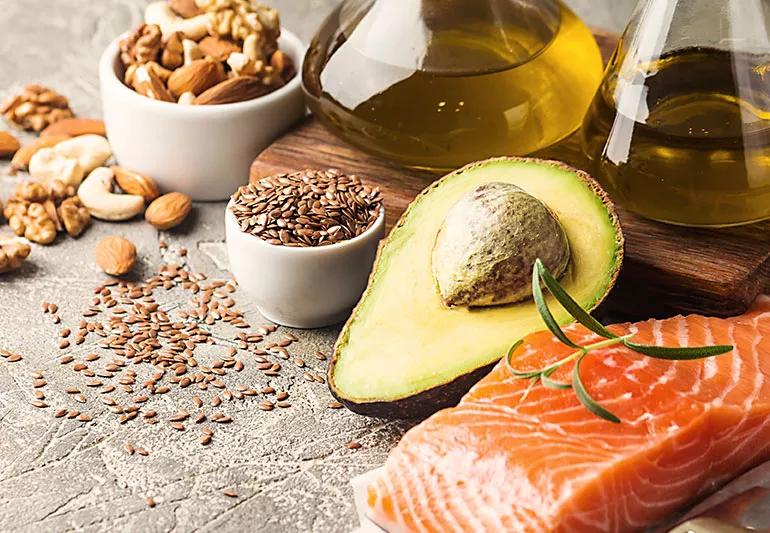And some of the best sources

Nutrition trends come and go. But omega-3 fatty acids are a nutrient that has stuck around — and for good reason.
Advertisement
Cleveland Clinic is a non-profit academic medical center. Advertising on our site helps support our mission. We do not endorse non-Cleveland Clinic products or services. Policy
Omega-3 fatty acids, commonly called omega-3s, are a group of unsaturated fatty acids that your body needs for many functions. Since it’s best to get the nutrients you need from foods instead of pills or supplements, it’s important to include foods rich in omega-3s in your diet.
But many Americans aren’t eating enough of this healthy fat. Registered dietitian Anna Taylor, MS, RDN, LD, explains the health benefits of omega-3s and which foods are the best sources.
Every cell in your body needs omega-3s, especially the eyes and brain. Omega-3s are also important for muscle activity, immune function, digestion and fertility.
But most of the research on omega-3s has studied its heart health benefits. “People who eat omega-3s in their diet may have less plaque buildup in their arteries, lowering the risk of heart attack and stroke,” Taylor says. “Omega-3s lower triglyceride levels and may slightly raise ‘good’ HDL cholesterol levels.”
Taylor adds that some research suggests eating more foods rich in omega-3 fatty acids, like fish, may have lower risks of cognitive function problems, like Alzheimer’s disease and dementia. It’s still an area of continuing research, though.
There are other possible benefits, too. Some research shows that regularly eating omega-3s may lower the risk of:
Advertisement
“Eating foods high in omega-3s is a good move for most people,” Taylor explains. “But don’t expect them to treat all your health conditions. Work with a doctor to manage health problems and talk to a nutritionist about the best diet for you.”
When a food label lists omega-3s, check which kind it contains. Omega-3 fatty acids are a group of different fats, not just one. And they’re not all created equal when it comes to their benefits.
The three main types of omega-3 are:
EPA and DHA are mainly found in fish. ALA is found in plant sources like canola oil, flaxseed, soy and walnuts.
“ALA is a precursor to the other types of omega-3,” Taylor explains. “A precursor means your body has to convert ALA to EPA and DHA.” This conversion process varies from person to person, and it’s not always efficient. So to really boost your body’s omega-3 levels, get at least some EPA and DHA from your diet.
If you want to add more omega-3s to your diet, eat more fish. This will give you the biggest dose of EPA and DHA. Choose fish that have the highest amounts of omega-3s, including:
Most adults should eat at least two servings of fish each week. If you have heart disease and don’t eat fish regularly, your healthcare professional may recommend EPA and DHA supplements. Fish oil supplements can interact with some medications, though, so check with your provider before taking them.
If you’re pregnant or nursing, you can safely eat up to 12 ounces of low-mercury fish per week. Some of the best choices are:
Avoid these types of fish, which have high mercury levels that can be harmful to a fetus or nursing baby:
What if you don’t like fish or you eat a vegetarian or vegan diet? “You can get some of your omega-3s from plants, but most vegetarian sources of omega-3 only contain ALA,” Taylor says. And while ALA is healthy, it won’t boost your body’s levels of omega-3 like DHA and EPA will.
How to get more ALA and vegetarian omega-3:
Advertisement
Algae oil contains DHA, making it a good vegetarian omega-3 choice. Food manufacturers may add algae or algae oil to foods and beverages. Look for DHA-fortified foods if you don’t eat fish.
Most people can safely add more fish to their diets to boost their omega-3 intake. But talk to a healthcare professional before you make any major diet changes or start taking supplements.
Advertisement
Learn more about our editorial process.
Advertisement

Cravings are a natural response to hormonal changes, but giving into them may make you feel worse

The popular skin care ingredient can help smooth, brighten and strengthen your skin

There isn’t enough research to recommend the supplement as a solution for lowering LDL levels

Alternating between periods of eating and fasting may benefit your health

Research consistently shows that soy-based foods do not increase your risk of breast cancer

Health officials say that consuming unpasteurized milk increases potential exposure to harmful bacteria

Properly prepared, elderberries can be a safe and healthy part of a balanced diet — just steer clear of supplements

The tropical fruit is a good source of antioxidants and vitamin C

Most people fall asleep within 10 to 20 minutes, but if your experience is different, adjusting your sleep schedule may help

Exploring your hidden side can lead to better understanding of what makes you tick